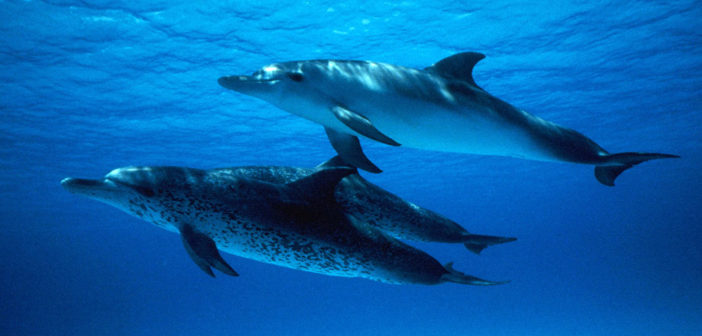An extensively researched 70-page report issued August 7th outlines how humans pose a growing threat to the lives of small cetaceans, with about 100,000 being killed worldwide each year.
The report was compiled by the organizations Animal Welfare Institute (AWI), Pro Wildlife, and Whale and Dolphin Conservation (WDC), and focuses on the hunting of small cetaceans, a grouping of marine mammals that includes dolphins, porpoises, and all other toothed whales except the sperm whale. There has been increased attention in recent years to small cetacean hunts in specific regions, such as dolphin hunts in Taiji, Japan, made famous by the 2009 documentary The Cove. However, the often-held assumption that small cetacean hunts are rare or only occur in a few regions is unfortunately far from correct.
Dolphins, porpoises, and small whales are regularly hunted for food or fishing bait in many regions of the world. The report states that the country with the highest count of small cetaceans killed annually is Peru, where around 15,000 dolphins die annually to be used as bait in shark fisheries. More than 1,000 small cetaceans are killed annually in many other countries, including Brazil, Canada, Greenland, Ghana, Guatemala, India, Indonesia, Japan, Madagascar, Malaysia, Nigeria, Republic of Korea, Solomon Islands, Sri Lanka, Venezuela, and Taiwan. The report identifies 56 species of small cetaceans that are actively hunted.
The vast majority of these hunts are unregulated, or often illegal, making kills difficult to quantify. This means that the report’s counts may be significantly under actual numbers. Additionally, the informal, underground nature of most hunts means that their sustainability is largely unknown and any relevant legislation is often unenforced.
In many regions, both the number of individuals and number of species of small cetaceans killed has increased markedly in the past 20 years. The report warns that direct hunting may grow to eclipse habitat loss and bycatch, the current primary threats to small cetaceans.
Small cetacean hunts are often conducted in ways that result in prolonged suffering before death, and hunted cetaceans who escape death can experience extensive physical and psychological harm. Because of the importance of social groups and relationships to small cetaceans, the loss of individuals who are hunted can go on to impact the group in lasting ways, including by lowering birth rates. The authors conclude that even with limited data, “it can be easily inferred that hunted small cetaceans, especially those taken with rudimentary weapons, are experiencing high levels of suffering and pain as a result of these practices.”
This issue also has relevance for those who remain unconcerned with animal welfare. A major driver of small cetacean hunts is poverty and food insecurity, especially where industrialized and unregulated fishing has depleted wild fish populations and growing human populations are seeking alternative protein sources. Along with their slow reproductive rates and the already threatened conservation status of many species, small cetaceans are not suitable food sources because they often contain high levels of dangerous substances such as mercury, PCBs, and other toxic compounds with demonstrated negative human health effects. The circumstances that are contributing to increased small cetacean hunts–such as large-scale overfishing, poverty, and lack of opportunities or education–are harmful to humans and cetaceans alike.
The report serves as an extensive resource, not only by compiling details on small cetacean hunts in many different nations, but also by providing specific recommendations to organizations such as the International Whaling Commision (IWC), Convention on the Conservation of Migratory Species of Wild Animals (CMS), and the governments of nations in which the hunts occur.
Read the entire report here.
Featured image: Wild dolphins. Image credit: bm.iphone, CC BY-SA 3.0





